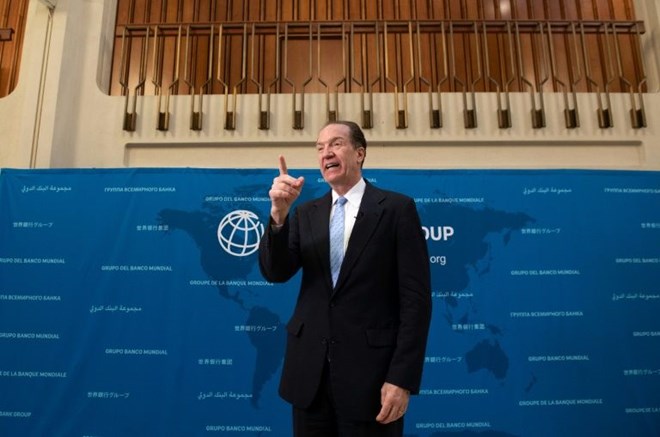
Sunday July 21, 2019

World Bank President David Malpass told AFP countries in Africa can have more of a direct impact on their economies than anything provided from outside (AFP Photo/SAUL LOEB)
Washington (AFP) - Global heat maps of extreme poverty show Africa in deep red.
And the problem will only accelerate as population on the continent grows in coming decades.
"The problems are very real and are large," newly installed World Bank President David Malpass told AFP in an interview.
The International Monetary Fund and World Bank have had a mixed record in addressing the longstanding challenge of poverty on the continent since the institutions were founded 75 years ago.
Now they must confront the need for massive investment in infrastructure and job creation in the coming years just to keep pace with the growing population on the continent -- all while simultaneously managing the threat posed by climate change in a region perhaps least able to confront the costs.
Malpass has made that mission a priority.
"I have put emphasis on having the bottom 40 percent of the population see more jobs, more cash income but also more of the inputs to a better living standard," Malpass said.
"That might mean access to healthcare, to education. And that would be better environmental practices -- all of that contributing to a more prosperous ... society."
In the most recent numbers available, World Bank data show extreme poverty fell worldwide to a new low of 10 percent in 2015. The number of extremely poor people -- those who live on $1.90 a day or less -- has fallen by more than one billion since 1990.
However, that number is on the rise in Sub-Saharan Africa, which was home more to than half of the world's extreme poor in 2015.
And forecasts indicate that by 2030, nearly nine in 10 extremely poor people will live in Sub-Saharan Africa, while the continent is expected to add 1.3 billion people, more than half the world's population growth.
Even with the IMF forecasting the region will see economic growth of 3.5 percent next year, it is not enough to create the 20 million jobs needed each year to absorb new entrants into the labor market.
When he first started in his position in April, Malpass immediately focused on the poverty mission,
and his first trip was to Madagascar, Ethiopia and
Mozambique.
"There are still 700 million people in extreme poverty and that's 700 million too many," he said in April.
The former US Treasury official, who was an outspoken critic of the World Bank, stresses that the bank must be more effective in its work to alleviate poverty and improve living conditions.
But while many African nations are saddled with high debt and the legacy of past mistakes, he insists that for the governments of the continent "good policies are a critical part of the path forward" so they can attract the private investment critical to fund projects and new businesses.
- Double the infrastructure -
But the continent also has seen a resurgence of armed conflicts, which have affected one-third of the countries in recent years. The IMF has estimated that these conflicts could cut three percentage points off of GDP every year, while creating a flood of refugees: 18 million in 2017.
Masood Ahmed, who worked at the IMF and World Bank for nearly half their 75 years of existence, says the challenge is enormous, especially as climate change threatens to disrupt everything else.
"The world economy in the next 20 years will be twice as large as it is today. The infrastructure that we need to support that economy will need to double," he told AFP. "And we have to do this in a way that results in net emissions going down by a third."
Ahmed, who now leads the Center for Global Development, an anti-poverty research organization, worries the World Bank may be too narrowly focused on policies in individual countries, rather than leading the way in developing "global public goods" to shape the choices countries will make that impact climate and pandemics.
But Malpass prefers to focus on country programs that tailor policies best suited for each situation, because the power to make changes that will have the most direct impact lies with the governments themselves.
For example, getting state-owned monopolies out of the way of private enterprise, and improving the legal system "allows businesses to start, that allows people to get skills that they need for jobs," he said.
A recently approved concessional loan in Kenya includes freeing up agriculture markets to allow small farmers to have better access to seed and other supplies.
Countries can meet the "huge" challenges" but they will need private investment including from expatriates, he said.
"Governments aren't going to have budgets big enough and they're not effective allocators of capital. So there has to be an environment where small businesses will invest."